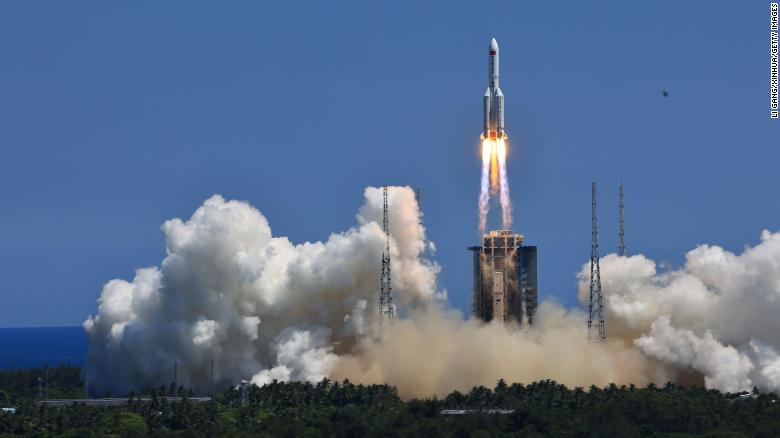Space Crises: Chinese Rocket Debris Falls On Earth Next Week With Likely Consequences
OpenLife Nigeria has gathered that the remnants of the massive Chinese rocket that delivered a new module to its space station on Monday are expected to fall to Earth early next week, according to US Space Command, which is tracking the rocket’s trajectory.
The 23-ton Long March 5B rocket which carried the Wentian laboratory module, took off from Hainan Island at 2:22 p.m. local time Sunday, July 24, and the module successfully docked with China’s orbital outpost.
Its job completed, the rocket has gone into an uncontrolled descent toward Earth’s atmosphere and it’s not clear where it will land. The uncontrolled descent marks the third time that the country has been accused of not properly handling space debris from its rocket stage.
“It’s a 20-ton metal object. Although it will break up as it enters the atmosphere, numerous pieces — some of them quite large — will reach the surface,” said Michael Byers, a professor at the University of British Columbia and author of a recent study on the risk of casualties from space debris.
Space debris poses an extremely minimal risk to humans, Byers explained, but it’s possible that larger parts could cause damage if they land in inhabited regions. Byers said that due to the increase in space junk, those small chances are becoming more likely, especially in the Global South, according to the research published in the Nature Astronomy journal, with rocket bodies being approximately three times more likely to land at the latitudes of Jakarta, Dhaka and Lagos than those of New York, Beijing or Moscow.
“This risk is entirely avoidable since technologies and mission designs now exist that can provide controlled reentries [usually into remote areas of oceans] instead of uncontrolled and therefore entire random ones,” he said via email.
Holger Krag, the head of the European Space Agency’s Space Debris Office, said international best practice was to conduct a controlled reentry, targeting a remote part of the ocean, whenever the casualty risk is too high.
He added that the re-entry zone for the rocket was geographically limited to between the latitudes of 41 degrees south and 41 degrees north of the equator.
The US Space Command said it will track the Chinese rocket’s fall back to Earth, according to a spokesperson.
Based on varying atmospheric conditions, the exact entry point of rocket stage into Earth’s atmosphere “cannot be pinpointed until within hours of its reentry,” the spokesperson said, but it is estimated to reenter the Earth’s atmosphere around August 1.
The 18th Space Defense Squadron, part of the US military that tracks reentries, will also provide daily updates on its location.
CNN, that earlier broke this report, however stated that China Manned Space Agency has yet to respond to its request for comment on the developing story.
Source: CNN






